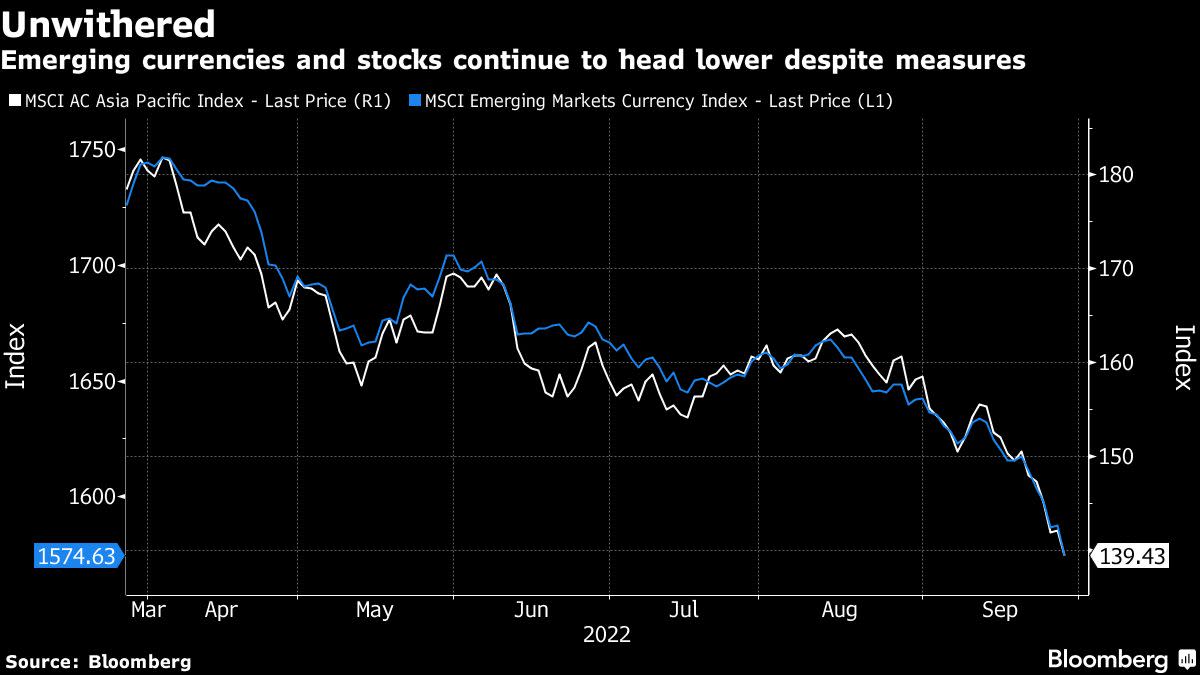
(Bloomberg) — After some of the most dramatic declines in global financial markets since the Federal Reserve began lifting borrowing costs six months ago, authorities in Asia are stepping up efforts to prevent a downward spiral.
South Korea joined a growing list of interventions on Wednesday, with the central bank saying it will buy as much as $2.1 billion worth of sovereign debt. In Taiwan, officials have floated currency controls and signaled a readiness to ban stock short sales. China has instructed some funds to refrain from large share sales and told banks to ensure the yuan’s daily fixing is being “respected” by market players.
Governments all over the world are grappling with the fallout from the Fed’s most aggressive trajectory of interest-rate hikes since the 1980s, with the rapid surge in the dollar yanking capital away from virtually everything else. Attempts to control markets in Asia — a region haunted by memories of the 1997 financial crisis — are so far yielding few convincing results.
“Intervention will only help to slow the decline in Asian assets, rather than stem it,” said Mitul Kotecha, head of emerging markets strategy at TD Securities in Singapore. “Higher US rates, a strong dollar and relatively low real rates across the region suggest pressure will persist in the weeks ahead.”
Authorities in Indonesia, Japan and India have also intervened outright to prop up their currencies. But the efforts appear insufficient.
The yen remains close to the 145 per dollar mark which triggered the last bout of intervention, and the onshore yuan has hit the weakest level since 2008. In a rare public statement released by the People’s Bank of China late Wednesday, a regulatory body said banks shouldn’t facilitate speculative bets on the currency, and that regulators will help guide the market on the “right track.”
“It will be difficult for the PBOC to buy the yuan, which will sap yuan liquidity from the money market, when the PBOC is trying to ease monetary conditions,” said Tetsuji Sano, chief Asia economist at Sumitomo Mitsui DS Asset Management. “China may take some minor steps to limit the yuan’s fall and deter capital flight, such as making the procedure for Chinese residents to buy foreign currencies more complicated.”
Authorities in South Korea have been relatively more successful as three-year bonds swung to a gain after the central bank said it would buy government debt. The benchmark Kospi Index trimmed losses to close 2.5% lower.
Questions are growing over whether increased intervention will be effective as Bank of America Corp.’s September survey shows that more global fund managers than ever are taking lower-than-normal risk. Despite more measures to stem the panic in Asia, Wednesday was one of the worst days for the region’s credit markets this year and the MSCI Asia Pacific Index fell to the lowest since April 2020.
Intervention is a balancing act for policymakers.
Too little action too late can lead to the perception that officials are powerless to handle financial-market volatility, risking a worsening spillover into the economy. But too much meddling can undermine confidence in the freedom of markets, like China’s handling of the stock-market bubble in 2015.
One constraint may come from the region’s declining foreign-exchange reserves, according to Nomura Holdings Inc. That may force Asian central banks to look for alternative ways to support their currencies, with measures that may include mandating exporters to sell foreign-currency proceeds, placing restrictions on trade accounts, and introducing measures to boost capital inflows.
©2022 Bloomberg L.P.